|
Although 2011 was a fruitful year for global film culture, every cinemagoer, whether casual or ardent, has begun to lose something integral to the cinematic experience; the very thing that allows us to see films projected at all: celluloid. Yes, that lulling rattle, the lullaby of those in love with the form, is slowly disappearing, in favour of digital. Certain camera companies, including Panavision and ARRI, have ceased production on cameras that take stock in favour of concentrating on digital projection. The projectionist's booth now contains space for hard drives that are tiny compared to the stacks of reels that once amounted to one film. Gloomy predictions already suggest that in a few short years, 35mm film will be run by fewer than 25% of screens the world over, turning what was once the norm into a niche market.
The 'death' of film has long been a topic of discussion, from Godard to Sontag and everyone in between, with the biggest platform of reaction and primary tool of the digital age, the internet, providing a writing space in which some wax nostalgic, lamenting something dear to them, while others veer towards the vitriolic. In many ways, this latest change does mean death; the death of its greatest icon. The communal cinemagoing experience has traditionally been defined by that noisy machine – the projector, the images it shows us, and the quality of the film stock. There's a warmth to celluloid that digital, in all its pristine glory, simply lacks, and for the well-seasoned viewer with keen eyes, there was always the pleasure – dare I say satisfaction? – of spotting a reel change, which of course can't happen when the reel and its contents are no longer commonplace. Tacita Dean's installation in Tate Modern's Turbine Hall, FILM, shot on 35mm stock, is itself a response to the drive toward digital, and the loss of the tactile qualities of film.
The nostalgic in me is at odds with the gadget-lover, iPad owner, and downloader of many a film from many a digital outlet. I'm not alone in this conflict of course, and it will always remain, purely because of the different relationships we all have with the two mediums. Fortunately, in death, there's also rebirth. Film has weathered many a technological storm: from the coming of sound, to television, to downloading and streaming. It's a step on the evolutionary ladder. The work of film archivists and historians will mean that celluloid will never be forgotten entirely, and there will always be die-hards who prefer it over every other medium, just as there are still people who collect vinyl records.
Though the way we see cinema is changing, what have these 12 months given us to see worth remembering with the same degree of fondness? Globally, franchises of various kinds, from the ongoing Twilight Saga, to the recently completed Harry Potter series, have kept a tight stranglehold on the box-office (say what you will about sparkly vampires and boy wizards, but it's no stretch to suggest that the latter of these two in particular has kept our the UK film industry afloat in lean times; how we cope afterwards is another matter entirely); but there has also been a revival of sorts for films that bring fresh ideas to a creative table that I had often thought stocked with stale goods. Film such as Steven Soderburgh's Contagion, Doug Liman's Fair Game, and George Clooney's The Ides of March, amongst others, prove that big-budgets and A-list casts don't always mean you have to trade in your intelligence when you pick up your ticket.
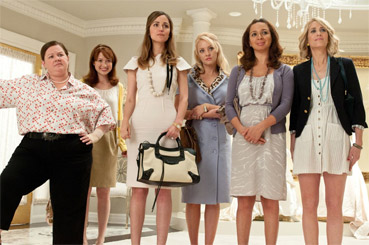
The biggest surprise of all to many a Hollywood marketing executive and audience member alike, wasn't any of those films, but rather a film that, by contemporary standards, shouldn't have been successful at all. Paul Feig's comedy Bridesmaids, written by, for, and about women, stands out for all the right reasons. Why? Simply because mainstream Hollywood, male-dominated and male-oriented isn't that interested in making films for or about women anymore. Feig is a rare exception to that rule. The film's success shows not only that women can be funny, but also that they can draw big box-office takings. Though ostensibly a mainstream film, which makes it somewhat out of our purview here, it's an important one nonetheless, especially when considered in the wider context of women in film. In contrast to that success, 2012 will be the first year since 2002 without a Birds Eye View Film Festival, itself a celebration of women filmmakers. A casualty of our times, the Festival's budget was cut by 90% follow the demise of the UK Film Council, which provided the majority of its funding. It's a bitter blow for filmmaking, given that the gender imbalance within the industry remains, despite the work of BEV over the last decade, and the successes of directors such as Kathryn Bigelow and Lynne Ramsay. Make no mistake, film culture will be the poorer for it, and I sincerely hope that the festival can return in 2013.
However, for British cinema as a whole in 2011, it's been a strong year. Once synonymous with two genres, heritage and social realism, its true nature is much more diverse than those staples suggest. In an ongoing process, filmmakers have begun to move away from the gilded cage of the past, and, instead, have carved out new stories that consider events fresher in the cultural conscience. This year in particular, this strand of films has become more prominent, partly because of the issues they present, but also because of the way they present them. Often directed by new and up-coming filmmakers, they also use a new set of stylistic principles driven by the speed of the times, ranging from the clever and comic, as in the case of Joe Cornish's Attack the Block, to darker and more thought-provoking offerings, such as Nirpal Bhogal's Sket.
Home-grown festival successes such as Steve McQueen's Shame, Tinge Krishnan's Junkhearts, and Carol Morley's Dreams of a Life (discussed below); like US independent films such as Dee Rees' Pariah (which is yet to pick up UK distribution, but will receive a limited release in the US from December 28th), Drake Doremus' Like Crazy, Sean Durkin's Martha Marcy May Marlene, and Jonathan Levine's 50/50; show that even in turbulent cultural, social, and economic times, creativity can flourish. I've often suggested in past years that modern cinema was becoming lazy due to its over-reliance on source materials of differing kinds – books, video games, television shows, comics, and graphic novels – or to Hollywood's constant need to remake everything, just because it can. Tempting though it is to suggest that reliance on remakes and adaptations is simply down to a failure of imagination, it's also important to remember that cinema needs to make money. In times such as these, where money is tight, risk-taking is a luxury we're often unable to afford.
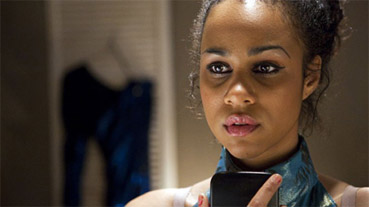
Likewise, it's easy to be negative, and think that everything has been said and done, but it's also easy to forget that there are countless filmmakers and writers working every day on new, intriguing and challenging material that will in turn inspire others into turning their scrap of an idea into something fully-fledged, which may be the start of a whole new career. It feels more important than ever to say that creative talent is rich and constantly diversifying, and to celebrate that.
The ebb and flow of any given film year is such that what impressed you in January has been superseded by what follows in the other eleven months. The widespread availability of films outside of theatres also means that it's not only much more difficult to keep track of my own viewing habits – digital technology has turned me into an even greedier cinephile than I was in my youth! – but also of the wider circulations of taste within film culture. The new formats that were once supplementary to my cinemagoing experience have now become integral to it. However, those new avenues mean you can effectively turn on your blinkers and limit your viewing experiences; you tend to watch films you're drawn to. No bad thing perhaps, particularly if you've grown tired of what's showing at your local multiplex.
It's worth remembering that even if your tastes are considered niche now, it's likely they weren't always so. The majority of our formative cinema experiences were either Disney cartoons (in the CGI era, the output of Pixar, Dreamworks and Aardman productions can be added to that) or your classic 'event' film of a summer blockbuster. By all means, love cinema because it's powerful, beautiful, poetic and artful, but also let yourself love it for no other reason than it made you smile, made you cry, introduced you to a new friend, reacquainted you with an old one, or simply let you step out of the real world for a while. If a film happens to do all of these things, then you're very lucky indeed. Whether you watch films on a phone or cinema screen matters little. Ultimately, when you cast aside concerns over quality and the viewing experience, and strip things back to their essence, what matters is that you watch them. Sharing that experience is important too, regardless of whether you talk to one person about it or to a whole room full of people.
Stripping down my list to just five films, and five DVD or Blu-ray releases (plus honourable mentions), while offering a sample of what the future has in store, proved a difficult task. To make the process easier, I changed the way I thought about what I'd seen. Consequently, these choices aren't defined as being the best – though there's some inevitable crossover with lists compiled using that criteria – but rather, they are films that I have admired, enjoyed and wish to champion.
Dreams of a Life
Carol Morley's haunting and thought-provoking film explores life, death, and the impact of one person on the world around them; and is based on the true, tragic story of Joyce Vincent, found dead in her Wood Green flat, where she lay undiscovered for three years. It's a sobering thought, and Morley's film definitely taps into our nagging fear of loneliness. In a world where everyone is connected at the click of a mouse, Joyce's fate seems even more cruel and uncommon, but at the same time, because our communities have become so fragmented, isolation is increasingly common and it's entirely possible for anyone to end up suffering the same fate. Everyone likes to think they matter, and once, Joyce mattered too. Stylistically, the film employs similar genre-blending (though some would argue they're genre-bending) techniques as Clio Barnard's The Arbor, with which it has much in common. Interviews conducted with Joyce's family and friends are married with impressions of her drawn from their discussions, throughout which Joyce is played by up-and-coming actress Zawe Ashton. Dreams of a Life is a stylistically bold film that's sensitively rendered, with a standout performance from Ashton. To say much more would take away from the experience, and what an experience it is.
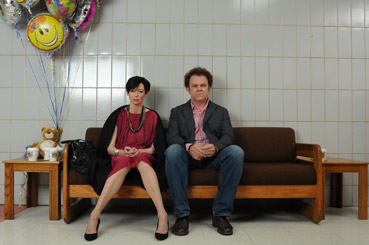
We Need to Talk About Kevin
You'd be hard pressed to find a better match for Lionel Shriver's novel than Lynne Ramsay, and the novel loses none of its power in translation from page to screen. Ramsay has never been one to shy away from contentious, dark or unpalatable subject matter. Kevin offers all three, as it considers the aftermath of a high school shooting, and does so with unparalleled depth. Since Columbine, there have been many attempts to deconstruct the reasons why such things happen, with varying degrees of success – from Gus Van Sant's Elephant to Andrew Robinson's April Showers, and, of course, Michael Moore's infamous documentary, Bowling for Columbine. Driven by character rather than sensationalism, Kevin's masterstroke is that it's not just about Kevin. It's also about Kevin's parents, Eva and Franklin, their guilt and the grief they feel about the actions of their son. Challenging, complex, and brutally honest, this is a meticulously made and acted film, with a career-defining performance from Tilda Swinton, and a breakthrough one for Ezra Miller.
La Rafle/The Round Up
Cinema is sometimes a medium for escapism and for artistic expression. At other times, it's a medium for truth-telling or a way for unheard stories to be told, changing it into a document of historical record instead. Rose Bosch's affecting World War Two drama possesses the latter of these qualities. Based on several years of research from Bosch's time as an investigative journalist, it brings to the screen one of the darkest moments in French history: the Vel' d'Hiv Round-up, where in July of 1942, 13,000 Jews were arrested and taken to the Winter Velodrome gymnasium, before their journey to Beaune-la-Rolande transit camp, and, finally, to the death camps of Nazi-occupied Poland. The story is told from the perspective of eleven-year old Joseph Weisman (Hugo Leverde) and his family, and expands to follow the lives of their friends, including Dr David Sheinbuam (Jean Reno), who struggles to care for the many sick and injured around him. Bosch's choice to follow a young boy, isn't a new one, but as with Mark Herman's The Boy in the Striped Pyjamas and Gilles Paquet-Brenner's Elle s'appelait Sarah /Sarah's Key (which also covers the events at Vel' d'Hiv), it works, purely because the material carries so much emotional resonance. When seen from the perspective of a child, the unfolding horror feels all the more monstrous. Though the film focuses on Vel' d'Hiv, it also takes care to depict life in Paris under the occupation, and the role of the Vichy government in the deportations (something which was not acknowledged by the French Council of State until 2009). Stylistically, the film's slightly glossy palette may be off-putting at first, because it carries connotations of lesser quality made-for-TV movies, but once the film settles, it's clear that it has much more depth than those initial appearances suggest. Over all, the sheer quality of what Bosch and her cast have created is hard to ignore.
Sleeping Beauty
Julia Leigh's debut film is more nightmare than fairytale. With echoes of Margaret Atwood's The Handmaid's Tale and Stanley Kubrick's Eyes Wide Shut, it tells the story of university student Lucy (an incredibly powerful Emily Browning), who, saddled with debts and holding down several jobs to pay them off, is drawn into escorting for an exclusive club of wealthy gentlemen, guided in quasi mother-daughter fashion by Clara (an impressive Rachel Blake). This is by no means an easy film to watch – Leigh, like her mentor for this project, Jane Campion, tests her audience and tests well – but it is a beautiful one, with a very particular aesthetic, that could turn out to be Leigh's trademark. Decadent and elegant, in a retro 1970s manner, it has a European flavour, and a curious, airless, museum-like (or perhaps mausoleum-like?) quality that chimes with the idea that Lucy and the other girls are perfect, forever, like a collector's toys kept out of reach behind glass cases, unloved and pristine. It has much to say about the relationship between desire and wealth, age and beauty, and the subjugation of women in society.
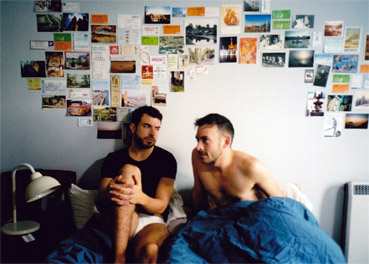
Weekend
With the exception of We Need To Talk About Kevin, Andrew Haigh's debut is probably the most well-known of the films in this list, purely because this low-key British love story has stolen the hearts of critics and audiences alike in its journey across the Atlantic, having been released in the US first. Is the glowing praise justified? Well, for once, I'm happy to say it is. After a chance meeting results in a one-night stand, Russell and Glen (Tom Cullen and Chris New respectively) are drawn to each other time and again, that initial attraction blooms into something more, and it's beautiful to watch, not least because they're both such different people, who project different versions of themselves to each other and the world. It's been touted, amusingly, as the gay equivalent of Brief Encounter. Though a neat catch-all, it's not quite right, even if the basic idea that two people, once strangers, can connect and form a bond of deep intensity, is the same. Weekend is not just a film for the gay community though, it's a film for everyone, and as such, has immense crossover potential, much like Ol Parker's romantic comedy Imagine Me and You. There's no heavy handedness, and this is definitely not an issues-lead film or one that concentrates solely on the ersatz side of romance. It's a simple love story, honestly told, and deftly executed by all involved.
Other Highlights
Paddy Considine's Tyrannosaur: a brutal and brilliantly observed directorial debut. Pedro Almodóvar's La piel que habito/The Skin I Live In: an enjoyable and fascinating exploration of beauty and art that's rendered in the director's typical high style. Nick Murphy's atmospheric gothic horror, The Awakening: with beautiful cinematography from Edward Grau, and another great performance from Rebecca Hall. Simon Curtis' My Week With Marilyn: this film will rightly be remembered for the Michelle Williams turn as Marilyn, which is already creating significant buzz, but it's also an interesting glimpse into a relationship of another kind, the one between Marilyn Monroe and Norma Jean Baker – where one ends, and the other begins. Last but by no means least, Martin Scorsese's Hugo: his first film for children, and an homage to film and filmmaking, it features a wonderful performance from Ben Kingsley, as the grandfather of cinema, Georges Méliès.
Miklós Jancsó Collection
In an excellent year for distributor Second Run, to choose just one release from their catalogue was incredibly difficult, but this one came out on top, purely for the quality of the three films included (My Way Home, The Round-Up, The Red and the White), and the care and attention given to each one. My review of the collection covers my thoughts in detail, so I won't repeat myself here. It's a fantastic set that's a real treat for any cinephile, and a wonderful way to celebrate the talents of one of Hungarian cinema's most revered filmmakers.
The Three Colours Trilogy
There's little that hasn't been said about this extraordinary trilogy from the late Krzysztof Kieslowski. Essential viewing for anyone just beginning to fall in love with cinema, it showcases everything that's good about it: from delicacy and grace, to brutality and a painfulness that resonates deep within your bones long after the credits have faded. Kieslowski's cinema is the kind you want to gorge yourself on, and the kind you wonder how you lived without. Essential too, for anyone who has had a long-term love affair with the medium. Even if you own it, make the leap, double-up, triple-up even, because this Artificial Eye set marks the UK debut of the trilogy on Blu-ray, and if any set of films deserved to make the leap to the format, it's these.
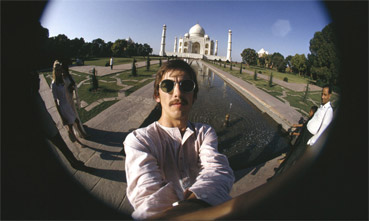
George Harrison: Living in the Material World
I've had the pleasure of growing up in a household where music is an integral part of life, and so I have a particular fondness for music documentaries, and they don't come better than this. Martin Scorsese's latest labour of love is devoted to the so-called 'quiet Beatle' George Harrison, covering his beginnings in Liverpool, through the heights of Beatlemania and beyond. For me, Scorsese has made some of the most interesting and insightful documentaries I've ever seen, whether concerned with cinema, like My Voyage to Italy and A Personal Journey with Martin Scorsese Through American Movies (dedicated to Italian and American cinema respectively); or music, such has The Last Waltz (Robbie Robertson and the Band), Shine A Light (The Rolling Stones), and No Direction Home (Bob Dylan), but this is his best, because it does so much more than present the man and his music. George is there, in more ways than one, in every single frame. Featuring a wealth of archive sources including home movies and family photographs, as well as interviews with Harrison's widow Olivia, and son Dhani, as well as Paul McCartney and Ringo Starr amongst others. This is a fine tribute to an inspirational man. The wealth of extras offered on the standard edition of the DVD and Blu-ray are reason enough to purchase it, but if you can, spend the extra cash, and opt for the deluxe version. If you do, you won't be disappointed, since it makes the experience even richer.
United
James Strong's poignant and sympathetic retelling of the Munich Air Disaster
garnered much critical praise (and a little controversy, thanks to the reaction of the late Sir Matt Busby's family) after its debut on BBC 2 earlier this year. The film is underpinned by strong performances from Jack O'Connell as a young Bobby Charlton, Sam Claflin as Duncan Edwards, and David Tennant as coach Jimmy Murphy. Though many documentaries have explored the events of that fateful flight – which crashed shortly after take-off, claiming the lives of 21 people, including 8 players from the Manchester United squad, several club staff, and journalists – this is the first attempt to approach it from the perspective of drama. Given the film's subject matter, it seems wrong to suggest that one of the many striking things about it is how beautiful it looks. The fine cinematography from Christopher Ross, and close attention to period detail (further explored in the DVD extras) make the scenes in Manchester realistic, rooted, and earthy; whereas those of the crash itself – sensitively handled – have an eerie, almost dream-like quality to them that chills, but never distances the audience, and is augmented by a haunting Clint Mansell score that weaves the two styles together.
Voice Over
The flipside strand of BFI releases has now entered 'unmissable' territory, purely because it's the champion of work that's visually exciting, often challenging but, ultimately, incredibly rewarding. Christopher Monger's intriguing and ambitious film, Voice Over, is no exception, and stands out as the jewel in the strand's already glittering crown. Cinema, for me, has always been primarily about discovery. There's always something new to find, and sometimes the very existence of a film can turn your world on its head for a while, giving you a new viewpoint on the world. Voice Over is one such life-affirming film, not because it's remotely twee, but because it's the opposite – cold, harsh, and grimly realistic – and engages you all the same.
Other Highlights
Pedro Costa's Juventude em Marcha /Colossal Youth receiving treatment worthy of its name with a wonderful two-disc set from Eureka's Masters of Cinema series. Peter Kosminsky's The Promise: in something of a renaissance year for television, this powerful and uncompromising generation-spanning political drama stood out, and makes for compelling viewing. Todd Haynes' Mildred Pierce: a high-quality and beautifully-realised take on James L Cain's novel, which is much closer to its source material than the acclaimed Joan Crawford film. The central performances of Kate Winslet and Evan Rachel Wood breathe new life into the roles of Mildred and Veda, arguably two of Hollywood's most iconic characters. Richard Linklater's much-loved teen film, Dazed and Confused, released as a feature-packed and director-approved 'definitive special edition' from Criterion. Finally, JJ Abrams' Super 8, which came as something of a surprise, and despite my misgivings, turned out to be an immensely enjoyable experience. It's a love letter to the 1980s blockbuster, and the mastery of Spielberg that has all the hallmarks of a classic.
It's usually at this point that I bemoan the amount of reboots or franchise films that are about to launch on to our cinema screens – yes, they're still there, chiefly in the form of Peter Jackson's long-awaited adaptation of The Hobbit, and Marc Webb's The Amazing Spiderman (with Andrew Garfield stepping into Tobey Maguire's shoes) – but there's also a plethora of films yet to grace our screens that exist very much outside of that bankable fodder.
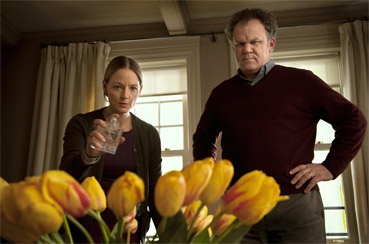
Carnage
Roman Polanski's darkly comic morality tale has already generated a fair amount of awards buzz, even if reviews have been slightly mixed to say the least. An international co-production, based on the acclaimed play God of Carnage by French playwright Yasmina Reza, the film's draw – beyond its famed director – is undoubtedly that of his cast, bringing together Jodie Foster, Kate Winslet, John C. Reilly and Christoph Waltz in the space of one frame. If that isn't enough for you, then the tantalising promise of an experience like the dark humour of Michael Haneke's Funny Games (in either incarnation) might do it.
Young Adult
Starring Charlize Theron, as teen writer Mavis Gary, this comedy drama has all the makings of an indie classic, not least because it reunites two of the creative talents behind Juno: Jason Reitman and Diablo Cody. Instead of debuting the film on the festival circuit, Paramount have decided to go back to basics and hold special screenings to build up buzz, and it's working. In addition, it also some of the most inventive poster designs (yes, really!), I've ever seen for a film in recent years.
Extremely Loud and Incredibly Close
Stephen Daldry's eagerly anticipated follow-up to The Reader. Based upon the novel of the same name by Jonathan Safran Foer, it centres on an autistic boy, Oskar Schell, who journeys across New York, carrying with him the key left behind by his late father, who died in the 9/11 attacks, in the hope of finding what it unlocks. Reviews so far have been generally positive, but it remains to be seen if it's still too early to explore the aftermath of those dark days on film.
The Great Gatsby
Take a classic novel, add two actors exemplary of their respective generations in Leonardo DiCaprio and Carey Mulligan, let Baz Luhrmann loose behind the camera, and you have the ingredients for one of the most interesting and inventive takes on F. Scott Fitzgerald's novel. With a young DiCaprio at his side, the man responsible for Moulin Rouge and Romeo + Juliet once made Shakespeare not only 'cool' but also accessible to the MTV generation, in a way that is yet to be bettered. Something similar could soon apply to The Great Gatsby. Let's hope he hasn't lost his touch.
Higher Ground
It feels odd placing the directorial debut of acclaimed actress Vera Farmiga in this list, since I honestly don't know if it will ever be seen on these shores. Based on Carolyn S. Briggs' memoir, This Dark World, Higher Ground follows the journey of a born-again Christian woman who begins to question her faith, and her attempts to restore it. If the trailer and the praise already afforded the film are anything to go by, it may prove that Farmiga's considerable talents aren't just restricted to acting.
|